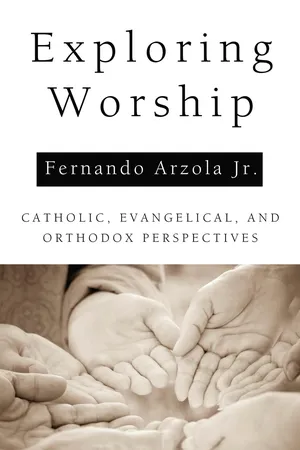![]()
1
Traditional Evangelical Perspectives on Worship
Understanding Evangelical Worship
Worship may be understood as the act of glorifying God, an act performed by a community of faith. For traditional Evangelicals, however, worship is a deeper, all-encompassing life experience.
Stanley J. Grenz, in Theology for the Community of God, asserts that worship is the ultimate purpose of the church; indeed, he believes this is why Christ initially instituted it. Grenz writes: “The church in all its expressions exists ultimately for the sake of the glory of the triune God . . . Although God made all creation in order to praise his name, something has gone wrong. In our sinfulness, we fail in our task of living for the divine glory . . . Christ came with this purpose in view . . . Jesus placed his impending sacrifice in the context of glorification: ‘Father, the time has come. Glorify your Son, that your Son may glorify you . . . I have brought you glory on earth by completing the work you gave me to do.’ (John 17:1b, 4) . . . The fundamental purpose of the church, therefore, is to bring glory to God.”
In his book, Systematic Theology, Wayne Grudem develops this notion by explaining the relationship between worship and glorification: “The term worship is sometimes applied to all of a Christian’s life and it is rightly said that everything in our life should be an act of worship and everything the church does should be considered worship, for everything we do should glorify God . . . Worship is the activity of glorifying God in his presence with our voices and hearts.”
The focus of this chapter is worship within the context of the gathered faith community. What is the purpose of worship in the local congregation? According to Grudem, “. . . the primary reason that God called us into the assembly of the church is that as a corporate assembly we might worship him . . .” Worship is therefore a direct expression of our ultimate purpose for living: “. . . to glorify God and fully enjoy him forever.”
The community worships God for two reasons. First, they worship God for who he is: God is the Holy One and the Creator. Second, they worship him for what he does, for his saving acts, supremely exemplified by his gift of salvation in Jesus Christ. And, Grenz adds, “. . . the risen Lord is now the recipient of worship.”
Furthermore, the worship of God “. . . reminds us that God is worthy of worship and we are not.” Therefore, the overall content and flow of the worship service should point to God and glorify him alone, avoiding, as much as possible, anything that might draw attention to us. According to Grudem, “. . . because God is worthy of worship and seeks to be worshipped, everything in our worship services should be designed and carried out not to call attention to ourselves or bring glory to ourselves, but to call attention to God and to cause people to think about him.” Grudem asserts that the worship of God is of great significance and has eternal value: “Because God is eternal and omniscient, the praise that we give him will never fade from his consciousness but will continue to bring delight to his heart for all eternity.”
Millard J. Erickson, in his book, Christian Theology, describes how worship is distinct from the church’s other functions. He also argues that, if worship is collapsed into other tasks, the healthy and growing body of Christ will be damaged. “In worship, the members of the church focus on God; in instruction and fellowship, they focus on themselves and fellow Christians; in evangelism, they turn their attention to non-Christians . . . Worship of God will suffer if the gathering of the body becomes oriented primarily to the interaction among Christians, or if the service is aimed exclusively at evangelizing the unbelievers who are present.”
The Means of Worship
What are the principal activities that serve as vehicles of worship for the traditional Evangelical? Grenz identifies four: (1) music, (2) declaration, (3) prayer, and (4) symbolic act.
For traditional Evangelicals, music is a significant means of worshipping, although preferred styles vary from congregation to congregation. Music sung may range from classic Protestant hymns to charismatic expressions to contemporary Christian music. One specific preference of many traditional Evangelical communities is “. . . songs that address God directly in the second person (that is, speaking to God as ‘you’ rather than speaking about him as ‘he’).”
Declaration is just that: declaring or telling one another of the greatness and goodness of God. At the heart of worship is the zenith point of that declaration, i.e., the proclamation of God’s Word in the sermon. For traditional Evangelicals, sacred Scripture contains all that is necessary for salvation and all that must be believed. Therefore, worship is normally designed to reach its crescendo with the sermon, which is delivered near the end of the service. Grenz explains: “This practice is correct insofar as it highlights the central role of the Scriptures in community life and the importance of understanding Scripture for community vitality. But implicit in the sermon is also its role as a specific way in which the people of God declare his goodness. As the church gathers to hear the sermon, they ar...
